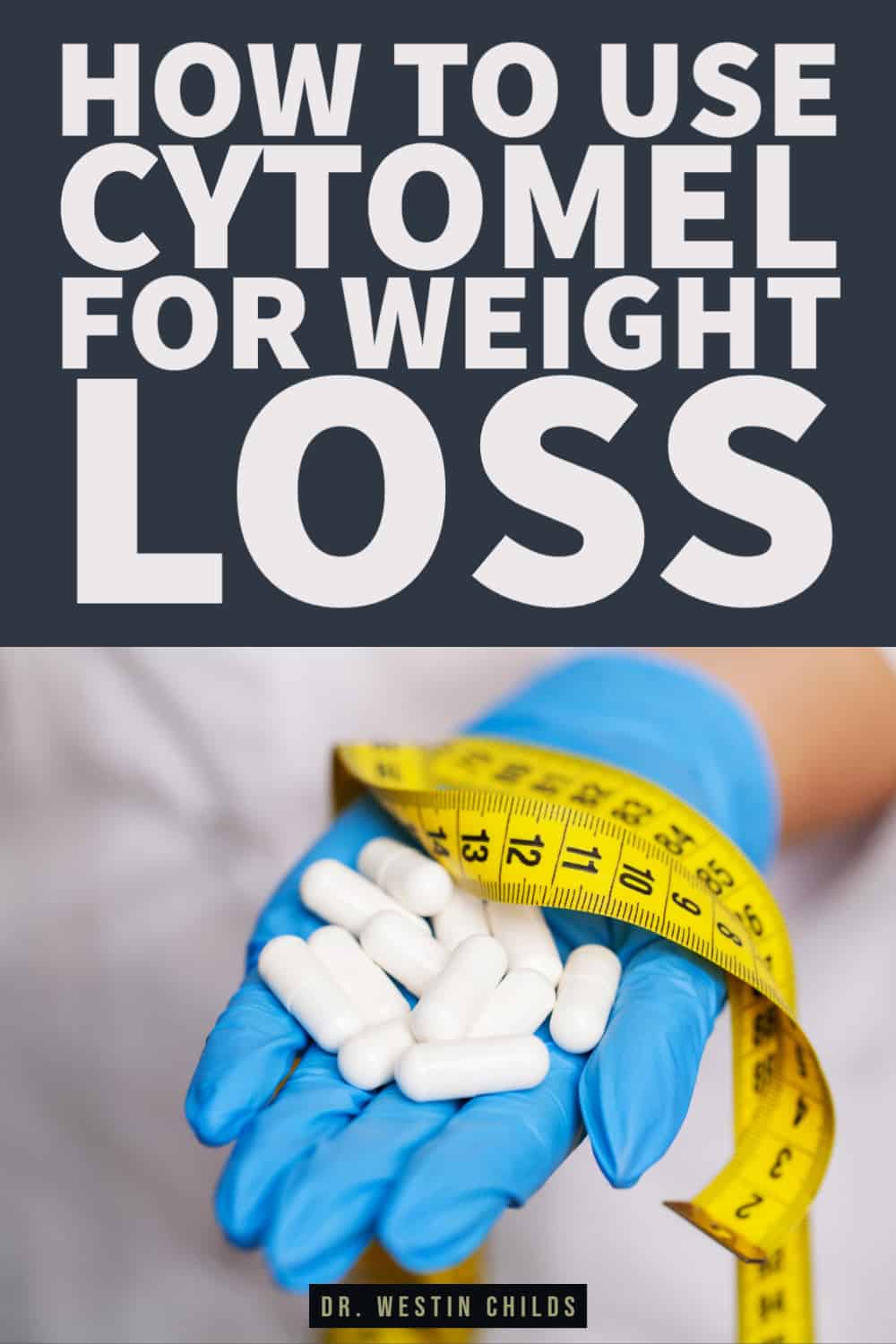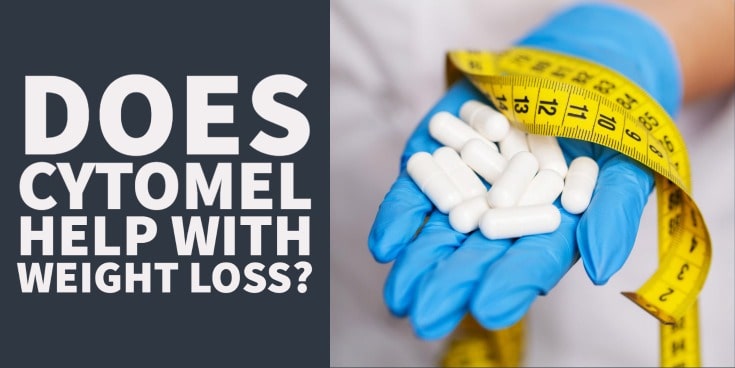Cytomel can help boost your metabolism and lead to weight loss and may be one of the most effective thyroid medications on the market.
Does that mean every hypothyroid patient should take it?
Not by a long shot.
Cytomel is one of my favorite thyroid medications but there are some things you should be aware of if you are considering using it.
One of those is using it correctly.
Not using it correctly will not yield the results you are looking for, may increase your risk of negative outcomes, and may cause confusion when it comes to your thyroid.
So let’s talk about how to use it correctly and, along the way, you’ll also learn important tips and tricks.
By the way, we are specifically talking about Cytomel today but almost all of this information also applies to liothyronine which is the generic version of Cytomel.
DOWNLOAD FREE RESOURCES
Foods to Avoid if you Have Thyroid Problems:
I’ve found that these 10 foods cause the most problems for thyroid patients. Learn which foods you should avoid if you have thyroid disease of any type.
The Complete List of Thyroid Lab tests:
The list includes optimal ranges, normal ranges, and the complete list of tests you need to diagnose and manage thyroid disease correctly!
What is Cytomel & Why Does it Work so Well?
Cytomel is a thyroid medication that contains pure T3 Hormone.
This puts Cytomel in a league of its own when compared to other thyroid medications.
Recall these facts basics from thyroid physiology:
T4 = INACTIVE thyroid hormone and must be converted to T3 to become active <— this is what most doctors prescribe (think Synthroid, levothyroxine, Tirosint, Levoxyl, etc.).
T3 = ACTIVE thyroid hormone which does NOT need to be converted to become active <— most doctors do NOT prescribe this hormone (medications in this class include Cytomel, liothyronine, SR T3 (1)).
Reverse T3 = Inactive thyroid metabolite that can be created from T4 in the presence of inflammation, stress, poor diet, nutrient deficiencies, and so on <— you want as little reverse T3 as possible to ensure your thyroid functions optimally.

This information is a little bit confusing if you are just hearing about it for the first time so don’t be afraid to read and re-read it until it really sinks in.
You’ll need to understand these basic facts for the rest of this article to make sense.
T4 can turn into T3 or reverse T3 depending on the conditions of the body.
So if you have hypothyroidism and you are taking a T4 only medication, you are relying upon your body to do the converting process for you.
This is why so many patients on T4 only medications do so poorly, their body doesn’t convert well.
But if you give someone T3-only medication, you don’t have to rely on the body for converting T4 to T3.
Instead, you bypass this conversion process and allow for more thyroid hormones to enter into target cells and tissues with limited reverse T3 competition and no activation or conversion necessary.
This provides an instant burst of thyroid hormone to the body and makes it a MUCH more powerful medication.
This also helps explain why Cytomel and liothyronine can cause negative symptoms if used in high doses.
And this also may explain why doctors, in general, are not as comfortable prescribing this medication to patients (even though so many patients benefit from taking it).
This is also why some bodybuilders use and abuse T3 medication to boost metabolism and burn fat before competitions or when they are trying to lean up.
How Cytomel Causes Weight Loss
In order to understand why Cytomel causes weight loss, you need to understand the importance of thyroid hormone in your fat cells and mitochondria.
Your thyroid helps control your metabolism and helps set your basal metabolic rate (2).
What that means is your thyroid really helps to control your weight and the amount of fat you are burning on a daily basis.
As many of you know:
Low thyroid hormone leads to weight gain (one of the primary symptoms of hypothyroidism).
But why doesn’t that weight go away once you start taking levothyroxine or T4 hormone?
It has to do with the conversion process I mentioned above (and probably some other factors we don’t fully appreciate or understand).
If you give the body T4 hormone and it does NOT turn it into T3 then your cells will NOT get the thyroid hormone they need and your metabolism will stay low.
This benefit has been shown in at least one study (3).
In this study, patients were given LT3 medication in place of their usual thyroid medication at equivalent doses and the researchers found that patients who switched medications experienced an average of 4-5 pounds of weight loss without any other changes.
These patients also experienced a reduction in body fat to the tune of 3-8%.
All of these benefits were seen simply by changing the dose and without adding in any other therapies!
This should give you an idea of just how powerful T3 thyroid hormone can be.
Should You Take Cytomel?
The answer is not as straightforward as it might seem.
If you’ve been reading this so far you are probably wondering why you aren’t taking T3 medication already.
Or maybe you’re getting ready to go ask your doctor to prescribe it to you…
Well, hang on a second.

Cytomel and other T3-containing medications aren’t ideal for everyone, but based on my experience many people tolerate them quite well.
How do you know if you tolerate them or would benefit from using them?
Most patients who benefit from T3 medications fit into one or more of the following categories:
- High levels of reverse T3 (> 15)
- History of leptin resistance (or leptin level > 12)
- History of diabetes, pre-diabetes, or insulin resistance
- History of bipolar disorder or a strong family history of depression, suicide, or other mental health disorders
- History of fibromyalgia, chronic fatigue syndrome, or chronic pain syndrome
- Someone who does not feel well on T4-only medications (Synthroid, levothyroxine, Tirosint, etc.)
All of the conditions listed above tend to be associated with a higher demand for thyroid hormone or a condition known as tissue-level hypothyroidism (4).
Tissue level hypothyroidism is a state where your blood levels of thyroid hormone may appear normal, but your tissues are starving for thyroid hormone.
This very condition may explain why so many hypothyroid patients are unhappy despite getting “treatment” with T4-only medications (5).
Cytomel Dosage and How to Use it Safely
Because Cytomel is stronger than T4-only thyroid medications, you should use some caution when starting and titrating your dose.
It is estimated that T3 is about 3-4 times more potent at altering the TSH when compared to T4 (6).
This isn’t a perfect estimation of how powerful T3 is compared to T4 but it can provide us with some general guidelines to follow.
When using T3 medication, of any type, it’s always a good idea to monitor your resting heart rate and your basal body temperature.
Why?
Because Cytomel and other forms of T3 will directly increase your metabolism thus resulting in a higher body temperature which will also increase your heart rate by acting on cardiac myocytes.
By monitoring both of these variables you can ensure that you are getting an adequate dose while preventing excessive dosing or hyperthyroid symptoms.
Taking even small doses of T3 can cause an increase in your heart rate which may not be felt unless you are actually testing for it.
Try to keep your resting heart rate and body temperature within these ranges when using Cytomel:
- Your body temperature should be no higher than 98.6.
- Your resting heart rate should be no higher than 70-80 beats per minute while resting (note this is different from your resting heart rate while sleeping as this value fluctuates during REM cycles).
These variables, if combined with thyroid lab testing for total T3 and free T3, will help you determine your ideal dose.
They will also keep you out of trouble and prevent you from accidentally taking too much and causing problems or symptoms.
I recommend using these metrics instead of one-size-fits-all dosing recommendations because the variability between individuals is very large depending on factors such as sensitivity and genetic variance.
In other words, some patients may do well on small doses of Cytomel whereas others may need considerably more.
How high are we talking about here? We can take a look at some clinical studies to give us an idea.
For perspective, most doctors start thyroid patients on doses in the 5mcg per day range.
There is a huge difference in terms of how you will feel using 5mcg of Cytomel versus 70mcg of Cytomel.
If you decide to start taking this medication make sure you start at a low dose and titrate or increase your dose slowly over an extended period of time (weeks to months).
A typical starting dose may be as low as 5-10mcg with an increase in dose by 5-10mcg every 10-14 days.
This is just a simple guideline to follow, though, and may not work for everyone.
More sensitive patients should start out at even lower doses while patients who have previously tolerated T3 medications in the past may be able to start at higher doses.
Cytomel vs Synthroid
Instead of thinking of Cytomel vs Synthroid, I want you to think of them as a complementary pair.
Some people do benefit from T3-only medications, referred to as T3 monotherapy, but many people do well even better on a combination of T4 and T3.
In fact, I would say the majority of people need some combination of T4 and T3 medications because this mimics the natural production of thyroid hormone from your thyroid gland.
In a practical way, you can achieve this combination by simply adding Cytomel to your existing dose of levothyroxine or Synthroid.
By using both T4 and T3 you will be able to provide your body with both immediate and long-term hormones.
When it comes to sheer power, Cytomel definitely is stronger than levothyroxine.

Despite this, you are much more likely to have success in asking for a small dose of T3 compared to asking for a large dose.
Many physicians are aware of the emerging research which shows that patients prefer combination therapy to monotherapy with LT4.
When using combination thyroid hormones, you will want to shoot for a ratio of close to 80% T4 and 20% T3 as this matches what your thyroid produces naturally.
For instance:
If you were taking 100mcg of T4 you would want to be on around 20mcg of T3.
Simply adding T3 to your existing dose of T4 may improve your overall symptoms by helping to drive down reverse T3 levels and by directly activating cellular transcription.
This is just a rough estimate, however, as each person may need slightly more or less.
You can, and should, also direct your dosing based on your thyroid lab tests such as TSH, Free T4, and Free T3.
Cytomel & T3 vs NDT
I referenced levothyroxine and Synthroid above because the great majority of patients are on these medications.
But what about natural desiccated thyroid medications?
Is Cytomel better than NDT?
Instead of thinking about which thyroid medication is best, you should consider the specific needs of your body.
NDT contains a static combination of both T4 and T3, each grain of NDT has about 38mcg of T4 and 9mcg of T3.
If you calculate the ratio you will find that the majority of hormone in this formulation is T4 (about 76%).
This means that even with higher doses of NDT, patients are still susceptible to reverse T3 pooling.
So, even though the medication contains some amount of T3 it may not be sufficient for certain patients.
In a general sense, the sicker the patient (more medical problems, high blood pressure, cholesterol issues, insulin resistance, etc.), the more likely they are to need higher doses of T3 compared to T4.
So again, T3 can complement patients already using NDT quite well.
The addition of Cytomel and liothyronine to existing doses of NDT provides an additional boost of T3 and skews the ratio of T4 to T3 more in favor of T3.
This allows for less competition at the cellular level between T3 and reverse T3 which can result in more weight loss and fewer symptoms (8).
- Note: If you are adding Cytomel to an existing dose of NDT due to reverse T3 pooling issues you will likely need to decrease your total dose of NDT to reduce serum levels of T4.
Sustained Release T3 (SR T3) vs Immediate Release T3
T3 comes in two different varieties:
- Immediate release: Cytomel and liothyronine
- Sustained release T3: Compounded and generally bound to methylcellulose
They both contain the active ingredient triiodothyronine but differ in how quickly they are absorbed into your gastrointestinal tract after ingestion.
Why would you care about how quickly the T3 is absorbed into your body?
It turns out that immediate forms of T3 are rapidly absorbed and spike serum T3 levels in the body within a few hours after ingestion (9).
The fact that your serum levels rise in this time frame isn’t really the problem.
The potential problem is that some tissues (mostly cardiac tissues) are very sensitive to T3 hormone.
The majority of thyroid hormone receptors in the cells respond through a nuclear receptor which results in changes to genetic transcription (changes in enzymes, DNA, etc.).
But, in cardiac tissues, T3 has a direct ionotropic and chronotropic effect (10).
This means that higher doses of T3 can directly result in an increased heart rate and an increased force of contraction in the heart.
These changes may manifest clinically as heart palpitations or a rapid heartbeat.
Generally, the sensation of palpitations is more concerning to the patient than it is medically relevant, but obviously, an increased force on the heart is not a good thing either.
This is where SR T3 comes into play…
Patients who are sensitive to T3 or who have a tendency to lean towards heart palpitations tend to do better on the sustained-release version of T3.
The delayed release allows for more stable serum levels of T3 which means your cardiac tissue doesn’t get hit with a high dose all at once.
SR T3 can also be used in patients who want fewer inactive ingredients in their medication because compounding pharmacies can control what ingredients they formulate the T3 with (to some degree).
This is helpful for patients who are very sensitive to medications, and supplements, and generally have adverse reactions to inactive ingredients.
A few things should be noted about SR T3 however:
1. SR T3 can be tougher to digest so isn’t necessarily the best choice in patients who have multiple GI issues or difficulty with absorption.
2. Due to digestive issues, SR T3 may not be fully absorbed which means that the dose is less efficacious than IR T3 versions. This means that 10mcg of IR T3 ingested will not necessarily equal 10mcg of SR T3 ingested.
If you are contemplating switching from IR T3 to SR T3 it’s important to consider these variables as they may alter your dose.
Cytomel Symptoms & Side Effects
If you are starting T3, Cytomel, or SR T3 then there are some side effects you should be watching out for.
Most side effects come from taking too much medication and result in hyperthyroid-like symptoms but the symptoms from Cytomel tend to be a little bit different from overt hyperthyroidism.
Common side effects of Cytomel include:
- Hair loss (usually goes away after 2-3 months)
- Heart palpitations
- Increased heart rate
- Increased body temperature, hot flashes, or warm flashes
- Weight loss (most common) weight gain (uncommon but does happen)
- Jittery sensation or increased anxiety
- Headaches
- Loose stool or diarrhea
These tend to be the most common side effects patients experience when starting or increasing the dosage of Cytomel but that doesn’t mean that they are necessarily common.
When you are replacing thyroid hormone that is deficient in your body you should only have positive side effects.
If you are experiencing negative side effects then that may be an indication that your dose is too high or that you increased your dose too rapidly over a short period of time.
Occasionally, when starting Cytomel or other T3 medications, the starting dose can be over-stimulating and may temporarily cause some of the symptoms above.
Usually, these symptoms will subside, especially when starting out on a low dose, but sometimes nutrient deficiencies and other hormone imbalances can make it difficult to tolerate T3.
You’ll know that Cytomel is working if you experience any of the following positive side effects:
- Weight loss
- Increased energy
- Decreased hair loss
- Increased cognition and improved memory
- Decreased brain fog
- Improved sleep
When starting T3 you should experience most of these symptoms and none, or very few, of the negative side effects listed above.
Improving T4 to T3 Conversion With Other Thyroid Medications
What if your Doctor isn’t willing to prescribe Cytomel? What are you supposed to do?
If you can get your Doctor to test your free T3 levels and show that they are quite low most physicians are willing to add in T3 hormone.
But this isn’t true of all Doctors.
If this just isn’t an option for you, then you will want to focus on T4 to T3 conversion and do whatever is in your power to increase this conversion process.
Factors such as taking certain supplements, adopting a healthy exercise routine, changing up your diet, and reducing your stress can all impact thyroid conversion.
If you can promote T4 to T3 conversion then you will necessarily reduce T4 to reverse T3 conversion.
By reducing T4 substrate and “forcing” your T4 to convert to T3 you are effectively lowering the reservoir of T4 that is capable of converting to reverse T3.
This has a great impact on your body and your symptoms.
The higher your free T3 the more active your thyroid hormone is, the lower your reverse T3, and the higher your metabolism will be.
But realize the opposite is also true:
The lower your free T3 and the higher your reverse T3 the slower your metabolism will be and the more likely you will be to experience symptoms of hypothyroidism.
Final Thoughts
Cytomel is a powerful thyroid medication that can help boost metabolism and lead to lasting weight loss in certain patients.
Having said that, Cytomel is NOT for everyone.
Use the information in this post to help determine if Cytomel would be helpful for your case and remember that each person is unique.
If you decide to try Cytomel out then I recommend starting with a low dose and titrating SLOW.
While using Cytomel make sure to monitor both your resting heart rate and basal body temperature to ensure that you do not overdose yourself.
Now I want to hear from you!
Have you used Cytomel successfully to lose weight?
If so, did it work for you?
Is this the first time you’ve heard about Cytomel or T3?
If so, are you considering trying it out? Why or why not?
Leave a comment below!
Scientific References
#1. http://www.ncbi.nlm.nih.gov/pubmed/16883675
#2. http://www.ncbi.nlm.nih.gov/pubmed/24692351
#3. https://www.ncbi.nlm.nih.gov/pmc/articles/PMC3205882/
#4. http://www.ncbi.nlm.nih.gov/pmc/articles/PMC3169863/
#5. https://www.ncbi.nlm.nih.gov/pmc/articles/PMC3148220/
#6. https://www.ncbi.nlm.nih.gov/pubmed/402379
#7. https://www.ncbi.nlm.nih.gov/pmc/articles/PMC5451035/
#8. https://www.ncbi.nlm.nih.gov/pubmed/28138133
#9. https://www.ncbi.nlm.nih.gov/pmc/articles/PMC4737508/
#10. https://www.ncbi.nlm.nih.gov/pmc/articles/PMC4318631/








